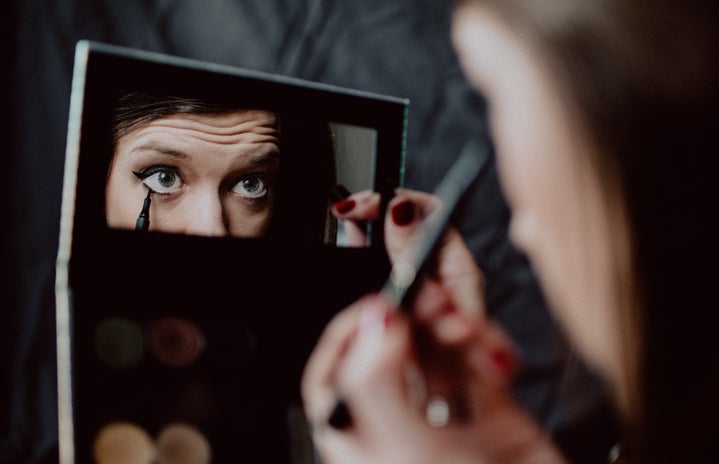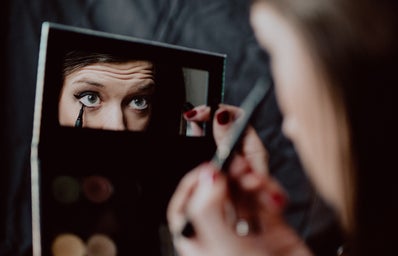Some time ago, the “foxy eyes” became a hot topic on social media, both in terms of beauty and as a racial discussion. At the time it was a very controversial issue, and many people had an opinion on it. But after all, do you know what is the problem with foxy eyes?
WHAT ARE FOXY EYES?
“Foxy Eyes” appeared a few years ago on social media, but became popular after many celebrities began to join the trend, such as Bella Hadid, Kendall Jenner and Ariana Grande. And it is nothing but a beauty trend that consists of lengthening the eyes, making them more “sensual”. The effect can be achieved in several ways, through makeup techniques, stickers that really pull the eyes or even through surgery.
Besides seeking to give a lifting effect to the look, which is a striking feature of Easterners, it was also accompanied by a pose with the hands pulling the eyes. Therefore, many Asian women began to show dissatisfaction and anger about the beauty trend. Consequently, the technique became associated with the practices of “yellow face”, which initiated the discussion about cultural appropriation.
WHAT IS YELLOWFACE?
Yellowface began many years ago in North American cinemas and theaters and just like any other culture and race rather than white, Asians also suffered from racist practices in the entertainment industry. Much like blackface, white actors dressed up to play Eastern Asian characters in movies. This happened through makeup, traditional clothing from Eastern cultures, dental prosthetics and stickers that pulled the eyes. A clear example of this is what happened in the classic movie Breakfast at Tiffany’s, where the American actor Mickey Rooney gave life to the role of Mr.Yunioshi, completely using the yellowface.
In addition to taking away the opportunity for Asian actors to participate and be included in film productions, there is also the matter of stereotyping and mocking Asian characters. That’s because most of the time, these characters were either the villains or the comic relief, as they were played in a caricatured way.
However, even though the foxy eyes trend and the pose that follows it did not emerge with the intention of discriminating against Asians, this technique still triggered many girls who suffered with their appearance throughout their lives.
EUROPEAN BEAUTY STANDARDS
Even though in recent years we have seen growth in the Korean music and beauty industry, and Asian people are gaining recognition in the media, it’s no news that the beauty standard has always been and continues to be white. They suffer discrimination and are mocked for their physical features. Focusing on Asians, the vast majority of whom have heard satirical and stereotypical comments about their appearance, concentrated mainly on their eyes.
For these and other reasons, issues of self-esteem, identification and denial of their traits are caused in non-white people. It is no surprise that many Asian women undergo aesthetic procedures, such as blepharoplasty, which modifies the eyelid region, aiming to “westernize” their eyes.
Therefore, it is understandable that the fox eyes trend and pose revolts Asian girls. Slanted eyes, which is a natural trait and a reason for many Asians to be bullied, have become a trend. However, it only began to be admired when it was applied to white women, such as the American model Kendall Jenner, who keeps the same aesthetic standards as always.
FOX EYES AND THE PANDEMIC
The fact that the fox eyes trend became popular in 2020, during the pandemic, caused discussions about cultural appropriation and people’s dissatisfaction to increase. This is because the COVID-19 virus was first identified in China, which caused hate crimes and discrimination against Asians to increase significantly, at the same time, the makeup technique became increasingly viral.
REPORTS OF ASIAN GIRLS
We spoke to some Asian girls about what they think of this trend and how they feel about it:
“I discovered makeup through a video talking about the issue […] I identified with it and it made a lot of sense to me, even though I have always been very self-assured of the fact that I am Asian. It’s never been something that affected my self-esteem, but I remember when I was little, saying things that weren’t appropriate or thoughts that I had, which nowadays I stopped and realized that was a bit of a problem”, says the student Anna, about how she met Foxy Eyes. Although she stated that she is not offended by the technique, she understands the seriousness of the issue, as it is a trend in which people seek precisely what they have always criticized.
Júlia Kioko, a journalism student, also told us that she is not offended by the trend, but highlighted the danger of aesthetic procedures in an attempt to fit into the fashion of the moment : “I am against the aesthetic procedure to obtain this definitive effect, I believe that people shouldn’t risk their lives just to meet a standard of beauty, as was the case with the young influencer who wanted to look like Jimin from the band BTS and ended up dying trying to acquire Asian features.”
Student Emi Yuki, 18, explains that “fox eyes” are not inspired by fox eyes, as the name suggests, but rather by Asian eyes. “I believe that when it comes to a person’s physical characteristics, it is not common to modify that characteristic with an aesthetic procedure, but this is starting to be the case. Having plastic surgery to change your appearance and look like the Asian population is, in my opinion, an appropriation” says Emy. Furthermore, she also concluded by highlighting the traumas and insecurities that many Asians carry, as a result of comments from many people who are now seeking procedures to have the same appearance.
In addition to them, who also spoke to the public about the discussion was the actress Ana Hikari, the first Asian actress to star in a soap opera on “Globo”, one of the main Brazilian television stations: “When we debate cultural issues that touch on issues of race, we are not talking about an individual attitude, but a collective symptom, about how the society sees certain people in about others” explains the artist. She also commented on her upset at seeing a physical feature of hers, which is a laughing stock, being considered beautiful in other people, mostly white people.
AND AFTER ALL, WHAT DOES THIS WRITER THINK?
I believe that no racialized person escapes prejudice and stereotypical comments throughout their lives. As a person of Japanese descent, I have always heard comments or people coming to talk to me using forced accents, such as switching from Rs to Ls. However, this was never really an issue for me, I never suffered from being a yellow girl, although I had a process of understanding myself as a racialized individual in society. I think it was an issue with myself, understanding that it was not possible for me to try to achieve white beauty standards, in addition to understanding all the stereotypes that people entail place on me just because I am oriental.
Do I feel offended? No, but I understand the matter with the trend. It is revolting for people who suffer because they are not white, and need to go through processes of decolonization of ideas they have about themselves, to see that their natural traits have become fashionable. Slanted eyes becoming fashionable after some white celebrities joined in, just shows how these features are only considered beautiful and attractive if they are on white women. This trend, even though it was not designed to discriminate against Asians, brings up many problems and triggers many people. Therefore, I believe that it is necessary for white women to have empathy and try to understand the outrage on social media, from racialized women.
—————-
The article above was edited by Fernanda Miki Tsukase.
Liked this type of content? Check Her Campus Cásper Líbero home page for more!


